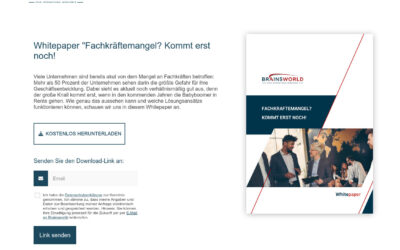Skilled labor strategy: Immigration Act in force since 18.11.2023 – what applies now?
Thanks for sharing in your network
The Skilled Immigration Act came into force on November 18, 2023. It is an important component of the German government’s skilled labor strategy. This aims to tackle the challenges of structural change and secure prosperity and social systems. While the Skilled Immigration Act focuses on foreign skilled workers, the Skilled Workers Strategy also includes domestic specialists as a target group (this article is based on the Federal Government’s presentation on bundesregierung.de).
Skilled labor strategy: 5 fields of action in focus
An important field of action of the skilled labor strategy is a modern immigration policy. Among other things, this involves reducing bureaucratic hurdles, such as the recognition of professional qualifications from the home countries of immigrant skilled workers from third countries. On the pages of the recognition portal of the Federal Ministry of Education and Research, skilled workers, professionals from authorities and employers can find information on professional recognition in 11 important languages. In addition, the other 4 fields of action are up-to-date training, targeted further training without age limits, an improvement in the quality of work and a change in working culture. The fields of action were published in a joint press release on October 12, 2022. Bettina Stark-Watzinger, Federal Minister of Education and Research, emphasized in this context:
„Well-trained skilled workers are our capital. At almost two million, there are more vacancies in Germany than ever before. The skilled labor strategy adopted by the cabinet today bundles the joint activities of politics, business and society to secure skilled labor.“
Further stages of the Skilled Immigration Act as a building block of the skilled labor strategy
New from November 2023 (selection)
- Skilled workers with a university degree from third countries will have more opportunities to immigrate to Germany with an EU Blue Card
- Lowering of the salary thresholds
- Expansion of the list of professions
- Facilitation of family reunification
- IT specialists can obtain an EU Blue Card even without a degree if they have the relevant professional experience
- Specialists with vocational training or academic qualifications are entitled to a residence permit under certain conditions
- Applicants with a qualified vocational qualification or university degree may accept any qualified employment in non-regulated professions
- Simplification of the employment of professional drivers
New from March 2024 (selection)
- Maximum stay of 3 years for participants in adaptation training or compensation measures in Germany
- Recognition partnership: enter Germany first and then complete the entire recognition procedure in Germany
- Prospective skilled workers can enter for qualification analysis and stay for up to 6 months
- Submission and employment in non-regulated professions for people with practical work experience and a vocational or university degree in their country
IT specialists still do not need a degree - Further changes for nursing assistants, the settlement permit for foreign skilled workers, facilitation of family reunification and the employment of students and trainees
New from June 2024 (selection)
- Entry from third countries with the new opportunity card to look for a job
- Increased quota in the Western Balkans regulation for nationals of Albania, Bosnia and Herzegovina, Kosovo, Montenegro, North Macedonia and Serbia
In principle, Germany’s further development into a modern immigration country is important and right. Nevertheless, there are a few things for immigrants and employers to bear in mind. At brainsworld.io, we know the challenges faced by foreign IT professionals who want to work in Germany. That’s why we offer comprehensive support throughout the entire recruitment process. Our strategically built network and access to talent pools in South America, Asia and Africa allow us to offer customized solutions – from matchmaking, navigating bureaucratic procedures and finding suitable accommodation to ensuring a smooth transition to the new workplace.
Image credit: AI tool Divi.
You might also be interested in …
Internationales Recruiting Trends – Wohin geht die Reise?
[shariff]Danke für's Teilen in Ihrem NetzwerkInternationales Recruiting Trends | Auch wenn es viele nicht mehr hören können: Der Fachkräftemangel in Deutschland ist mehr als ein Mythos oder das übliche “Klagen der Kaufleute”. Er ist ein immer deutlicher werdendes...
brainsword.io @Hinterland of Things Konferenz – Warum wir Fachkräfteeinwanderung brauchen
[shariff]Danke für's Teilen in Ihrem NetzwerkAuch in diesem Jahr war brainsworld.io wieder auf der Hinterland of Things Konferenz in Bielefeld, um für unser Anliegen eines starken Wirtschaftsstandorts durch Fachkräfteeinwanderung aus Drittländern Flagge zu zeigen. Am...
Fachkräfte suchen im Ausland | Wo lohnt sich die Suche über vernetztes Internationales Recruiting?
[shariff]Danke für's Teilen in Ihrem NetzwerkPrinzipiell rekrutiert Deutschland bereits Fachkräfte aus verschiedenen Regionen der Welt, um dem Arbeitskräftemangel in Schlüsselindustrien zu begegnen. Und durch die Umsetzung wirksamer politischer Maßnahmen und...
Wie kann ein optimierter Recruiting Prozess die Qualität des Internationalen Recruitings verbessern?
[shariff]Danke für's Teilen in Ihrem NetzwerkGrundsätzlich ist der globale Recruting Prozess ein strukturierter Ansatz zur Gewinnung, Auswahl und Einstellung der besten Kandidaten für eine Stelle. Eine effiziente und effektive Gewinnung von Fachkräften aus dem Ausland...
Fachkräftemangel Statistik & Einblicke: Jetzt kostenfreies Whitepaper downloaden!
Was sagt die Fachlräftemangel Statistik? Wieviel Geld kostet die Entwicklung durch ein sinkendes Wertschöpfungspotenzial? Was sind die demographischen Prognosen bis 2070? Und welche Auswirkungen hat dies alles auf den Arbeitsmarkt? Deutschland unter die Lupe nehmen...
Ausländische Berufsqualifikationen anerkennen lassen – Alles klar? Oder gibt’s noch Fragen?
[shariff]Danke für's Teilen in Ihrem NetzwerkDas seit dem 18.11.2023 geltende Fachkräfteeinanderungsgesetz macht es Arbeitssuchenden aus Drittstaaten und deutschen Arbeitgebern in vieler Hinsicht einfacher. So wurden die Hürden für ein zentrales Thema gesenkt - die...
Global Recruiting – ein Beitrag zur Willkommenskultur in Unternehmen?
[shariff]Danke für's Teilen in Ihrem NetzwerkGesetze zur Erleichterung der Einwanderung von Fachkräften schaffen die Basis dafür, dass Fachkräfte aus Engpassberufen zu uns nach Deutschland kommen und hier bleiben. Damit Maßnahmen der Regierung ihre Wirkung voll...
Blaue Karte EU: Was ändert sich ab November 2023?
[shariff]Danke für's Teilen in Ihrem NetzwerkAb November 2023 kommt die neue Blaue Karte der EU. Sie ist Teil des neuen Fachkräfteeinwanderungsgesetzes und senkt Hürden für die Einwanderung von Fachkräften aus Drittstaaten. Vor allem erweitert Sie den Kreis der...
Chancenkarte: Wirklich bessere Karten für ausländische Fachkräfte und Unternehmen?
[shariff]Danke für's Teilen in Ihrem NetzwerkMit dem neuen Fachkräfteeinwanderungsgesetz vom 7.7.2023 (die Regeln sollen ab November 2023 schrittweise in Kraft treten) kommt auch die Chancenkarte für aussichtsreich Spezialisten aus Drittländern ohne konkretes...
Neues Fachkräfteeinwanderungsgesetz verabschiedet. Es tut sich etwas, aber tut sich genug?
[shariff]Danke für's Teilen in Ihrem NetzwerkAm 7. Juli 2023 hat der Bundesrat das Fachkräfteeinwanderungsgesetz beschlossen. Die Regeln sollen ab November 2023 schrittweise in Kraft treten. Es tut sich also etwas beim Thema Entbürokratisierung der Einwanderung für...










